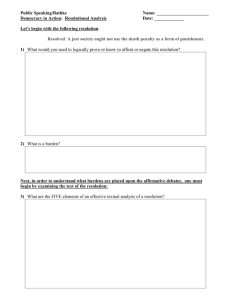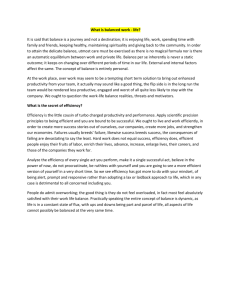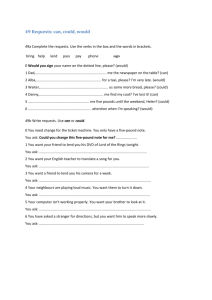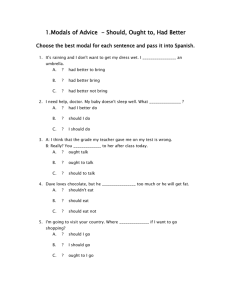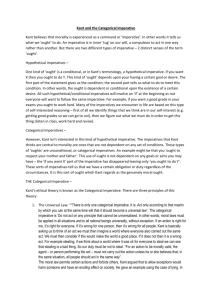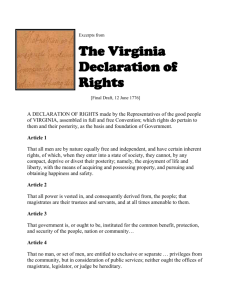Kant`s Groundwork, Self-Undermining, and “Ought”
advertisement
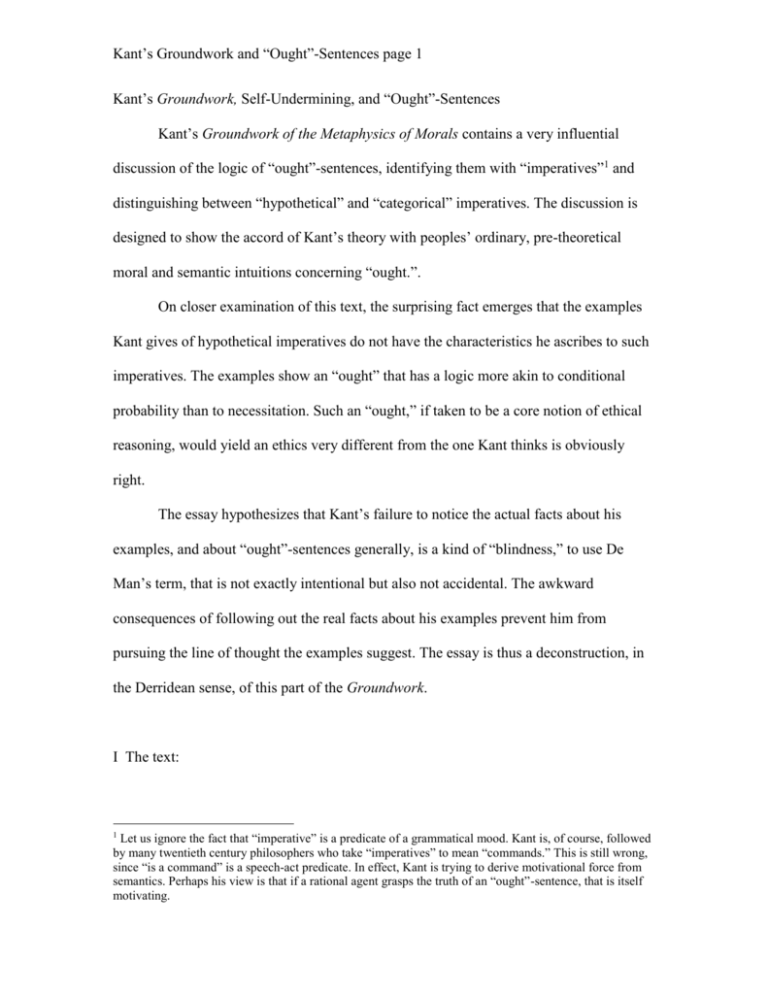
Kant’s Groundwork and “Ought”-Sentences page 1 Kant’s Groundwork, Self-Undermining, and “Ought”-Sentences Kant’s Groundwork of the Metaphysics of Morals contains a very influential discussion of the logic of “ought”-sentences, identifying them with “imperatives”1 and distinguishing between “hypothetical” and “categorical” imperatives. The discussion is designed to show the accord of Kant’s theory with peoples’ ordinary, pre-theoretical moral and semantic intuitions concerning “ought.”. On closer examination of this text, the surprising fact emerges that the examples Kant gives of hypothetical imperatives do not have the characteristics he ascribes to such imperatives. The examples show an “ought” that has a logic more akin to conditional probability than to necessitation. Such an “ought,” if taken to be a core notion of ethical reasoning, would yield an ethics very different from the one Kant thinks is obviously right. The essay hypothesizes that Kant’s failure to notice the actual facts about his examples, and about “ought”-sentences generally, is a kind of “blindness,” to use De Man’s term, that is not exactly intentional but also not accidental. The awkward consequences of following out the real facts about his examples prevent him from pursuing the line of thought the examples suggest. The essay is thus a deconstruction, in the Derridean sense, of this part of the Groundwork. I The text: Let us ignore the fact that “imperative” is a predicate of a grammatical mood. Kant is, of course, followed by many twentieth century philosophers who take “imperatives” to mean “commands.” This is still wrong, since “is a command” is a speech-act predicate. In effect, Kant is trying to derive motivational force from semantics. Perhaps his view is that if a rational agent grasps the truth of an “ought”-sentence, that is itself motivating. 1 Kant’s Groundwork and “Ought”-Sentences page 2 In the following passages, the Academie edition2 is used for citations and the translation follows Ellington3. 1) 413 “All imperatives are expressed by an ought…” Note that the German says “Sollen,” not “Mussen.” “Ought” and “should” are the appropriate translations. “Must” would be the appropriate modal in imperatives, so an implication is that “ought” and “must” are synonymous. As we will see, the very examples Kant uses show that this is not the case in the conditional construction, at least.4 2) 414 (my emphasis) “Now all imperatives command either hypothetically or categorically. The former represent the practical necessity of a possible action as [a] means…… Every practical law represents a possible action as good and hence as necessary…… Now if the action would be good merely as [a] means to something else, so is the imperative hypothetical.” Neither definite nor indefinite articles precede “means” (Mittel) in the above passage. However, the logic of “practical necessity” and congruence with the passages on 417 below would seem to require “the,” if an article were needed. So the insertion of “a” by the translator is uncalled for. 3) “the only means,” “the means,” and “the sole means” 2 Konigliche Preussiche Akademie der Wissenshaften, Berlin 1911, Volume Four. Kant, Ethical Philosophy, translated by James Ellington, Hackett 1983. 4 Many would argue that the categorical “ought” is synonymous with the categorical “must.” However, that cannot be defended by appeal to the “hypothetical” “ought” although there could be independent reasons for doing so. In the present case, Kant is implicitly arguing that the categorical “ought” is a categorical “must” by asserting that the conditional “ought” is really a conditional “must.” 3 Kant’s Groundwork and “Ought”-Sentences page 3 The following passages (with my emphasis) show that Kant’s conception is that “ought” means “must” and implies that willing an end requires willing a particular means. Given an end, there is a means that must be willed also. 3a) 417 “But when I know that the proposed result can come about only by means of such an action, …” 3b) 417 “Whoever wills the end wills the means that are indispensably necessary to his actions and that are in his power.” 3c) 418 “…whoever wills the end also wills…the sole means thereto which are in his power.” Necessitation5 would follow from “sole” “the” and “only.” “Must” would indeed be appropriate and the sense of “ought” in “hypothetical imperatives,” since the proposed end would indeed select exactly one means. 4) The examples The following are both of the examples of hypothetical imperatives Kant gives in this exposition: 415: “The prescriptions needed by a doctor in order to make his patient thoroughly healthy and by a poisoner in order to make sure of killing his victim….” 417: “Mathematics teaches us …that in order to bisect a line according to a sure principle I must from each of its extremities draw arcs such that they intersect.” II The examples and the account: 5 Kant here uses a sense of “necessity” as “constraint,” sort of the Platonic notion of Necessity. So imperatives, “ought”’s, don’t apply to God. Kant’s Groundwork and “Ought”-Sentences page 4 The problem is that the two examples that Kant gives obviously fail to fit his characterization of the “hypothetical imperative.” Kant’s examples both mention means that have alternatives and so are not necessitated: Consider the prescription (by the doctor or poisoner) examples: “If you want your patient to get well, you should prescribe Aspirin” But Ibuprophen or Tylenol, among a host of other analgesics, might be just as effective. “If you want your enemy to die for sure, you ought to get him to ingest arsenic.” But the list of poisons is very long indeed. Cyanide or strychnine, for instance, will do as well as arsenic. So these example of hypothetical imperatives are not cases where the “proposed result can come about only by means of such an action, …” Nor are they cases in which the willer must will “…the sole means thereto which are in his power.” The second example fares no better. Here is one alternative to Kant’s imperative: “If you want to bisect a line segment, you should construct equilateral triangles above and below the segment, and connect the vertices.” So, these are not cases where “the only means,” “the means,” or “the sole means” is being given for satisfying a particular desire. These are ordinary conditional “ought”sentences. III Conditional “Ought”-sentences Ordinary “hypothetical imperatives” (i.e. conditional “ought”-sentences with a possible object of desire in the antecedent) aren’t necessitations, at least because there are Kant’s Groundwork and “Ought”-Sentences page 5 multiple means to almost all ends. So the “ought” in such sentences is not a “must.” 6 The force of a normal conditional “ought” utterance is not “imperative” and its justification is not usually formulable in exceptionless laws that would yield necessitations. “Ought”sentences typically make recommendations based on the particulars of a situation. For example, that you ought to take I-84 and connect with the Mass Pike to get from Hartford to Boston does not imply that there is no other way. I-91 to Route 20, and taking a town road in Sturbridge to Route 9, will get you to Boston, but is quite a bit longer. However, if there are construction delays on the Mass Pike, or if you want to enjoy the scenery in the Brookfields and have lunch in Worcester, the longer route might be the one you ought to take. Given the indefinitely large number of possible different circumstances, and the huge variety of possibilities for routes from Hartford to Boston, any general advice about how to get from Hartford to Boston would require a ceteris paribus clause. If we meditate on such examples, and read Davidson’s “How is Weakness of the Will Possible?”7 the following characteristics of conditional “ought” sentences with “desire” antecedents emerge: 1) Such “ought”-sentences describe the best (as far as we know) option in the circumstances. “Best” depends on the details of the situation, only some of which are ever available. So, a judgment that is the best can offer about what someone ought to do, 6 In fact, there is a weak implicature from “ought” to the negation of “must.” “If you want to major in Philosophy you ought to take 211” is misleading if 211 is in fact required. “Ought” weakly implies that you have a choice, unlike “must.” Davidson, Donald, “How is Weakness of the Will Possible?”, in Essays on Actions and Events, Oxford UP 1980, pp. 21-42. 7 Kant’s Groundwork and “Ought”-Sentences page 6 relative to a desire, may be mistaken in light of information that emerges after the judgment. 2) Thus new information can lead one to retract a formerly justified “ought”-sentence. In a typical situation in which an “ought”-recommendation is being made, the information is incomplete. More information that could be received might change the recommendation. For instance, discovering that the person undertaking the trip to Boston is utterly enthralled by New England town greens might lead one to say she ought to go by the Route 9 route that takes her through West Brookfield. And so on. That information might be over-ruled by considerations of time constraints, or the fact that young and easily bored children will be along on the trip. And so forth. 3) So, the relation between the information about the situation in which the desire takes place and the “ought”-judgment is inductive, not deductive. “Ought”-inferences, i.e. practical inferences, have the structure of inductive arguments. Deductive inferences and inductive inferences8 have very different properties. In a classical deductive inference, given a valid inference from A1..An as premises to C as conclusion, adding further premises An+1..An+m preserves validity. In inductive inference, the inference from premises A1…An to conclusion C can be very strong while the inference obtained by adding premises An+1,…An+m is very weak. Examples of this difference abound. In a murder case, Sherlock can have overwhelming evidence that Fred murdered Joe. Fred hated Joe, Fred’s prints were on the It is doubtful that there is anything like a “logic” for “inductive” arguments. Such a logic would be a general account of the degree of support that arbitrary sets of sentences as premises give to an arbitrary conclusion. Hempel’s argument, in “Studies in the Logic of Confirmation,” reprinted in Aspects of Scientific Explanation, Free Press, 1965, that such a logic would have the impossible requirement that novel theoretical terms be generated by an algorithm, show that “inductive logic” is a fond hope. So, by “induction” this essay will intend “non-deductive reasoning.” 8 Kant’s Groundwork and “Ought”-Sentences page 7 knife, Fred has confessed to the crime, and the like. But, when Sherlock discovers that Fred is a quadriplegic, adding that as a premise, the support of the augmented set of premises for the conclusion that Fred murdered Joe is very weak. Many, at least, of the “laws” used in practical inference are probabilistic generalizations. So, in addition to the possibility of there being more information, the bearing of that information is often probabilistic. Thus reasons for an “ought”-judgment are not generally conclusive. So, Kant’s “rules of technique” for the various sciences are often not universally quantified conditionals, but statements of conditional probability. 4) In the case of a “hypothetical imperative,” at least, limited information does not always determine what you really ought to do. Something currently unknown may be the case that would change the judgment. 5) In the case of hypothetical imperatives, there is no certain method for making the right recommendation in a finite time. Whatever an agent does on the basis of available information may be the wrong thing. III The Categorical Imperative If Kant had modeled the Categorical Imperative on Hypothetical Imperatives that have the features of “ought”-sentences that his examples show, such Categorical Imperatives would have different features from what Kant proposes. A somewhat Kantian theory9 along such lines might treat Categorical Imperatives as “ought, all things considered” sentences. That is, Kant could perhaps treat “ought”-sentences without an “if”-clause as hypothetical imperatives with the available information about the situation together with what an individual in a situation ought to want. Considerations about the Let us leave aside an issues in semantics common to both conditional probability and conditional “ought”sentences, namely whether the conditional or categorical construction is primary. 9 Kant’s Groundwork and “Ought”-Sentences page 8 nature of rational agenthood could presumably be the basis for calculating what a person, qua rational agent in this particular situation, ought to want. So, “Fred ought to marry Susan” would ascribe wants to Fred that a rational agent in Fred’s situation ought to have, and make a recommendation based on current information. Complete knowledge of everything that was the case about Fred’s situation would then yield an “ought” that was not only justified, but objectively true. Since such knowledge would be available only to an infinite being, there would be no general way for humans to evaluate categorical imperatives objectively. The main feature that would distinguish such a categorical imperative from Kant’s is its sensitivity to further information. Kant’s categorical imperative, using “must” and therefore having a deductive logic, allows an agent to determine what must be done given limited information. Once an agent knows that an action would be a lie, its moral character is determined. If new information can always change an evaluation, a good will would not protect you from doing the wrong thing. Circumstances that an agent was not aware of could make the negation of a justified “ought”-judgment true. You could, with the best of intentions, maxims, and care, do the wrong thing. Further unKantian consequences10 would follow if the categorical imperative were modeled on real conditional “ought”-sentences. 10 For instance, the theory would lose the nice parallels between the laws of nature and the laws of morality, with the two domains of “must.” Newtonian mechanics would not have a parallel in the science of rational agency. Furthermore, given that there is room to meet one’s duty without doing the best possible thing, “ought” would not be “obligation,” since this categorical “ought” gives the very best action under the circumstances. The relation between obligations and what one ought to do would be obscure. Legal, financial, and familial obligations, with their sometimes relativized “musts,” might be powerful reasons for courses of action, but not necessarily compelling ones. The “moral ought” would have to be some kind of special case, not derived from either relativized obligations nor from “ought.” Kant’s Groundwork and “Ought”-Sentences page 9 It is of course open to Kant to claim that the “ought” in conditional “ought”sentences, i.e. hypothetical imperatives, is unrelated to the moral “ought.” Kant could argue that, when the topic is morality, we have absolutely binding “oughts’” But this is to argue in a very different way than that which actually takes place in the Groundwork. IV So what? What explains this anomaly in Kant’s argument? I think we can reject out of hand the suppositions that Kant was careless, or that he hadn’t thought about deliberation much. Likewise, we can reject the hypothesis that Kant was dishonest and was trying to trick the reader into thinking that his “hypothetical imperatives” had the logic of “must.” I think the answer has to be that Kant thought he knew what a correct ethical theory should conclude, namely that what one primarily morally ought to do is one’s duty. He also saw a nice argument from a conditioned “ought” to an unconditional “ought” given that the conditioned “ought” was just like the moral “ought” in its force, that is, a requirement. Kant may not have noticed that his examples did not quite work since he was convinced of the result. Examining the actual features of the conditional “ought” and constructing the categorical “ought” on its model would undermine morality as he understood it. There would be no law-like structure by which one could determine the right thing to do, and the best of finites wills could do the wrong thing. If morality is such that a human can be sure of doing the right thing, the categorical imperative has to be as Kant developed it. Otherwise, wrong actions may be unavoidable, and morality has no sure principles. A morality that is not governed by deduction from principles threatens unavoidable wrong Kant’s Groundwork and “Ought”-Sentences page 10 actions. So he shied away from a closer examination of his examples of deliberative recommendations. If this last conjecture seems plausible, it is worth noting that it has the same structure as Derrida’s discussions of Hegel, Rousseau, Plato, Husserl, et al. The above argument-form is one kind of deconstruction. A single text that is, in one way or another, “incoherent” or “in tension” shows something about the author’s concerns and the extrarational attractions of certain views. Where Derrida focuses on conceptions of representation and the demands those conceptions make, this focuses on concerns that moral action be secure and determinable. V Why did this happen? One could make conjectures about the psychology of Kant or of Western Man generally that would attempt to explain his demand for certainty that one’s actions are not wrong. I think the reason Kant seeks an account of morality that rests on exceptionless principles has deep roots in Western Civilization. The Hebrew conception of God as King mixed moral ideas with traditional political ideas. If you look at other ancient Middle Eastern law codes, for instance the Code of Hammurabi or the numerous other pre-Hebrew codes, you see that the topics are always social relations. There are no laws about purely personal behavior. Religious matters are not a topic. Sexual relations, except as they have consequences for the larger society, are not a topic. Hammurabi is not interested in telling people what to do, except insofar as that has effects on the social order. Kant’s Groundwork and “Ought”-Sentences page 11 The Hebrews adapted ancient law codes to their perception of their special circumstances.11 Those circumstances were that God was also their king. Thus the line between those things that were of concern to the society at large and those things that concerned only individual behavior was erased. So, the Hebrew law codes, which we find in Exodus through Deuteronomy, treated moral questions, such as what kind of entities may I fuck, as legal matters. God’s instructions covered a wide variety of topics that had not been dealt with in other Middle Eastern codes. Since so many of the mitzvoth that the Torah enjoined were ethical, the idea arose that the ethical could be subsumed under the legal—that morality had the structure of a law code. Jesus as free from sin and in Paul’s claim that he was perfect, so we can (in principle) be perfect, reflects the idea that it is possible to avoid doing the wrong thing by careful attention. In fact, given that humans have finite information-gathering abilities, it is practically impossible to avoid doing what turns out to be the wrong thing. Kant was the heir, a couple of millennia later, to this idea that ethical questions could be adjudicated by appeal to a deductive system. This idea that, with the best of intentions and the purest spirit, one could do the wrong thing, was out of the question. We should abandon that idea. Ethics is like induction. New information and novel considerations can change our judgments. Morality is not an the output of an algorithm. “Moral principles” are guidelines. See “The Origins of Israelite Monolatry,” an essay that is not exactly in any field, and so unpublished, but posted on my page on academia.edu. 11


